 Dans le cadre d'une vaste campagne contre la clause de cessation du statut de réfugié des rwandais qui devrait être prononcée le 30 juin 2013,Scott Erlinder, un cinématographe américain, a publié un film intitulé « Stateless »( Apatrides ). Ce film a été réalisé en collaboration avec plusieurs réfugiés rwandais, des experts américains et des membres de l'ONU.
Dans le cadre d'une vaste campagne contre la clause de cessation du statut de réfugié des rwandais qui devrait être prononcée le 30 juin 2013,Scott Erlinder, un cinématographe américain, a publié un film intitulé « Stateless »( Apatrides ). Ce film a été réalisé en collaboration avec plusieurs réfugiés rwandais, des experts américains et des membres de l'ONU.Thursday 31 January 2013
« Apatrides » : « Les Rwandais ont encore des raisons de fuir »
 Dans le cadre d'une vaste campagne contre la clause de cessation du statut de réfugié des rwandais qui devrait être prononcée le 30 juin 2013,Scott Erlinder, un cinématographe américain, a publié un film intitulé « Stateless »( Apatrides ). Ce film a été réalisé en collaboration avec plusieurs réfugiés rwandais, des experts américains et des membres de l'ONU.
Dans le cadre d'une vaste campagne contre la clause de cessation du statut de réfugié des rwandais qui devrait être prononcée le 30 juin 2013,Scott Erlinder, un cinématographe américain, a publié un film intitulé « Stateless »( Apatrides ). Ce film a été réalisé en collaboration avec plusieurs réfugiés rwandais, des experts américains et des membres de l'ONU.Impamvu zatumye Kagame yirukana umukozi mukuru wa Ambasade y’Ububiligi mu Rwanda
Impamvu zatumye Kagame yirukana umukozi mukuru wa Ambasade y'Ububiligi mu Rwanda
Amakuru Umuvugizi ukura mu nzego z'umutekano za Leta ya Kagame, yemeza ko uyu musirikare w'Umubiligi yirukanywe azizwa kuba yaratahuye, akanabona za gihamya simusiga zerekanaga uko Perezida Kagame atera inkunga umutwe w'inyeshyamba za M23, inyeshamba zikomeje kwica imbaga y'inzirakarengane mu turere twinshi twa Repubulika Iharanira Demukarasi ya Kongo, zikanasahura umutungo kamere w'icyo gihugu, aho kugirango uwo mutungo ugoboke abanyekongo ubwabo bakomeje kurushaho gutindahara.
Gasasira, Sweden.
HRW World Report 2013 Rwanda chapter / Rapport mondial 2013 chapitre Rwanda
Date: 31 janvier 2013 15:26:17 UTC+01:00Objet: HRW World Report 2013 Rwanda chapter / Rapport mondial 2013 chapitre RwandaPlease find attached the chapter on Rwanda from Human Rights Watch's World Report 2013 published today. The report provides an overview of the main human rights developments in 2012.Veuillez trouver ci-joint le chapitre sur le Rwanda du Rapport Mondial 2013 de Human Rights Watch publié aujourd'hui. Le rapport donne une vue d'ensemble des événements principaux en matière des droits humains en 2012.
HRW World Report 2013 Rwanda chapter / Rapport mondial 2013 chapitre Rwanda
Date: 31 janvier 2013 15:26:17 UTC+01:00Objet: HRW World Report 2013 Rwanda chapter / Rapport mondial 2013 chapitre RwandaPlease find attached the chapter on Rwanda from Human Rights Watch's World Report 2013 published today. The report provides an overview of the main human rights developments in 2012.Veuillez trouver ci-joint le chapitre sur le Rwanda du Rapport Mondial 2013 de Human Rights Watch publié aujourd'hui. Le rapport donne une vue d'ensemble des événements principaux en matière des droits humains en 2012.
SYFIA GRANDS LACS : Rwanda : Faible et divisée, la société civile est l'alliée du pouvoir
From: Gerard Semushi Karangwa <karangwasemushi_gerard@yahoo.fr>
To: "rwanda-l@yahoogroups.com" <rwanda-l@yahoogroups.com>; "rwandanet@yahoogroups.com" <rwandanet@yahoogroups.com>; "democracy_human_rights@yahoogroupes.fr" <democracy_human_rights@yahoogroupes.fr>
Sent: Thursday, January 31, 2013 8:22 AM
Subject: *DHR* SYFIA GRANDS LACS : Rwanda : Faible et divisée, la société civile est l'alliée du pouvoir
31-01-2013Rwanda : Faible et divisée, la société civile est l'alliée du pouvoir
Une grande partie des organisations de la société civile rwandaise préfère être proches du pouvoir pour pouvoir survivre sans risques. Les autres, régulièrement combattues, ont du mal à faire entendre leur voix.Au Rwanda, une partie de la société civile soutient le gouvernement en toutes circonstances. Début novembre 2012, quatre églises chrétiennes et l'association des Musulmans du Rwanda ont adressé une lettre au secrétaire général des Nations unies protestant contre le rapport du groupe d'experts onusiens accusant le Rwanda de soutenir le mouvement rebelle congolais dit M23. Elles remettent en question "l'intégrité de ces experts, la méthodologie employée et les conclusions de ces rapports basées sur des preuves insuffisantes" et tentent d'expliquer que les preuves d'implication du Rwanda ne sont pas entièrement fondées. En décembre dernier, la plateforme de la société civile s'est empressée de donner son avis sur la suspension des aides étrangères au gouvernement rwandais. L'organisation a condamné cette décision, brandissant qu'elle était basée sur les allégations non fondées.
Au moment où une partie de la société civile est active et multiplie les déclarations de soutien au gouvernement, l'autre se contente de regretter que ses opinions ne soient pas prises en considération et dénonce, sans effet, les difficultés d'obtenir des documents administratifs pour pouvoir fonctionner.
Pour Épimaque Okwoko, secrétaire exécutif de la Ligue des droits de la personne dans la région des Grands lacs (LDGL), collectif régional basé à Kigali, "La société civile doit servir de contre-pouvoir pour éclairer les décideurs politiques. Ce qui la fragilise, c'est surtout le fait de toujours suivre ce que dit le gouvernement." "C'est ainsi, ajoute-t-il que celui qui ose donner un avis contradictoire est pris pour un opposant politique. Par peur de subir ce que subissent les opposants, on décide de se taire ou d'être partisan.
Pour bon nombre de Rwandais, la société civile n'est autre qu'une caisse de résonnance du gouvernement. "Elle n'a pas de poids pour négocier avec le gouvernement. Ses plaidoyers ne changent rien aux décisions des autorités alors qu'elle devrait être la voix des sans voix", remarque un villageois de Gasabo.
Peur de la solidarité
Au cours des deux dernières années, les secrétaires exécutifs de la ligue rwandaise pour la promotion et la défense des droits de l'homme (Liprodhor) et de la LDGL ont pris le chemin de l'exil. D'après leurs proches, ils ont quitté le pays car d'autres membres de la société civile les qualifiaient d'"ennemis du pays" suite à leurs prises de position sur les violations des droits de l'homme.
"La solidarité au sein des organisations de la société civile laisse à désirer", note un journaliste de Kigali. Lors de l'élaboration du rapport de la société civile en marge de l'examen périodique universel du Rwanda en 2011, les organisations se sont désolidarisées. Certains ne voulaient pas ternir l'image du pays en dénonçant des violations des droits de l'homme commises par le pouvoir. "Lorsque les autorités s'en prennent au fonctionnement d'une organisation, les autres condamnent l'accusée au lieu d'apporter leur soutien", témoigne un membre de la LIPRODHOR. Pour Édouard Munyamariza, porte-parole de la plateforme de la société civile, la voix de la société civile se fait bien entendre : les plaidoyers sur la décentralisation du budget alloué à l'agriculture, sur la collecte des cotisations de la mutuelle de santé, ont été pris en considération par le gouvernement.
Lors de la célébration de la journée de la paix et de la démocratie mi-septembre 2012, le président du sénat, le docteur Jean Damascène Ntawukuriryayo, avait expliqué aux membres de la société civile qu'il "ne leur manque pas d'espace d'expression, mais de compétences pour exploiter les droits qu'ils ont".
Encadré
Les Ong strictement encadrées
Les autorités rwandaises encadrent de près le travail des Ong. La loi de février 2012 oblige toute Ong, qui veut se faire agréer, à fournir, chaque année, son plan d'action, son budget et ses sources de financement. Le gouvernement exige aussi que les actions de ces organisations s'inscrivent dans les plans de développement national et des districts. Mais, même si toutes les conditions sont respectées, certaines demandes peuvent être rejetées quand l'autorité juge avoir des preuves convaincantes que l'organisation requérante peut compromettre la sécurité, l'ordre public, la santé, la morale et les droits de la personne. "Ainsi certaines Ong "suspectes" passent de longs mois à chercher ces documents", constate un activiste des droits de l'homme de Kigali. Pour lui, "le pouvoir multiplie des tracasseries aux Ong pour les maintenir sous pression".
En novembre 2011, le district de Nyarugenge a fermé les bureaux de la Liprodhor en application de la décision de la ville de faire respecter le plan directeur de l'urbanisation, avançant que sa maison qui l'hébergeait était dans un site résidentiel et non dans des logements destinés à être bureaux. "L'organisation est vouée à la disparition, car la location du bureau est très chère", note un activiste des droits de l'homme de Kigali qui ajoute que "compliquer le travail des Ong, ne pas leur faciliter l'obtention de documents administratifs pour chercher des fonds affaiblit la société civile. C'est un frein au développement du pays, dont la société civile est un acteur incontournable". Avis partagé par le secrétaire exécutif de la LDGL pour qui le processus d'enregistrement des Ong fait sentir le poids et le contrôle du gouvernement. "Celle qui n'accepte pas de s'allier au pouvoir risque de ne pas obtenir les documents administratifs reconnaissant son existence et d'être qualifiée de hors la loi".Albert-Baudoin Twizeyimana__._,_.___http://fr.groups.yahoo.com/group/Democracy_Human_Rights
Maître Innocent TWAGIRAMUNGU
DHR FOUNDER&OWNER
Tél.mobile: 0032- 495 48 29 21
UT UNUM SINT
"L'extrémisme dans la défense de la liberté n'est pas un vice; La modération dans la poursuite de la justice n'est pas une vertu".
"Extremism in the defense of liberty is no vice; moderation in the pursuit of justice is no virtue." (USA,Republican Convention 1964,Barry Morris Goldwater (1909-1998)).
"Le monde ne sera pas détruit par ceux qui font le mal mais par ceux qui regardent et refusent d'agir", Albert EINSTEIN.
Les messages publiés sur DHR n'engagent que la responsabilité de leurs auteurs.
CONSIDERATION, TOLERANCE, PATIENCE AND MUTUAL RESPECT towards the reinforcement of GOOD GOVERNANCE,DEMOCRACY and HUMAN RIGHTS in our states.
Liability and Responsibility: You are legally responsible, and solely responsible, for any content that you post to DHR. You may only post materials that you have the right or permission to distribute electronically. The owner of DHR cannot and does not guarantee the accuracy of any statements made in or materials posted to the group by participants.
" BE NICE TO PEOPLE ON YOUR WAY UP, BECAUSE YOU MIGHT MEET THEM ON YOUR WAY DOWN." Jimmy DURANTE.
COMBATTONS la haine SANS complaisance, PARTOUT et avec Toute ENERGIE!!!!!!
Let's rather prefer Peace, Love , Hope and Life, and get together as one!!! Inno TWAGIRA
.
__,_._,___
2013 World Press Freedom Index: Rwanda falls 5 places
2013 World Press Freedom Index: Rwanda falls 5 places
 The association also lists Paul Kagame next to other African heads of state such as those of Eritrea, Djibouti and Swaziland, describing them as 'members of an exclusive club of authoritarian African leaders, some eccentric others stern, who hold their countries in an iron grasp and keep a firm grip on news and information.'
The association also lists Paul Kagame next to other African heads of state such as those of Eritrea, Djibouti and Swaziland, describing them as 'members of an exclusive club of authoritarian African leaders, some eccentric others stern, who hold their countries in an iron grasp and keep a firm grip on news and information.'2013 World Press Freedom Index: Rwanda falls 5 places
2013 World Press Freedom Index: Rwanda falls 5 places
 The association also lists Paul Kagame next to other African heads of state such as those of Eritrea, Djibouti and Swaziland, describing them as 'members of an exclusive club of authoritarian African leaders, some eccentric others stern, who hold their countries in an iron grasp and keep a firm grip on news and information.'
The association also lists Paul Kagame next to other African heads of state such as those of Eritrea, Djibouti and Swaziland, describing them as 'members of an exclusive club of authoritarian African leaders, some eccentric others stern, who hold their countries in an iron grasp and keep a firm grip on news and information.'Why Kagame will not discuss third term, at least not now
Why Kagame will not discuss third term, at least not now
Why Kagame will not discuss third term, at least not now
Why Kagame will not discuss third term, at least not now
BBC News - Matonge: Congo-Rwanda dispute hits heart of Europe
Matonge: Congo-Rwanda dispute hits heart of Europe
By Dan DamonBBC World Service, Brussels
30 January 2013 Last updated at 04:10
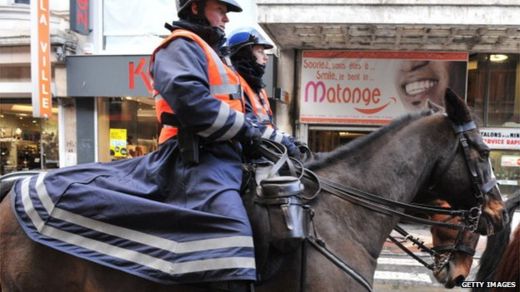
Tensions between Rwanda and the Democratic Republic of Congo are being played out among the diaspora communities - and perhaps nowhere more so than in one district of the Belgian capital.
African grocers, dozens of hairdressers, and music and video stores line the streets of Matonge in Brussels.
There is a Matonge in the Democratic Republic of Congo's capital Kinshasa too. When Belgium was the colonial power, the Congolese who came to Brussels created a marketplace a little bit like home - although Matonge in Kinshasa is a lot livelier, and the weather is better.
There is a substantial community of people from Central Africa living in the Brussels Matonge - including around 25,000 from DR Congo, many of whom are naturalised Belgian citizens, and perhaps 10,000 Rwandans.
They come to Matonge to shop. But in recent months, they have come to argue, too, about DR Congo's war - and sometimes to fight.
Congolese here blame Rwanda for perpetuating the war in eastern DR Congo by arming and supporting rebel militias, plundering the country's mineral wealth.
Each Tuesday, supporters of the Congolese and Rwandan opposition gather outside the Rwandan embassy to call for an end to Rwanda's interference in DR Congo.
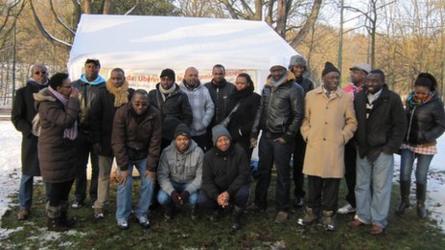
But occasionally the protests spread to the streets of Brussels, and Rwandans in Matonge have been targeted.
Rwandan Grace Nyawumuntu's brother Jules paid the price.
After a demonstration by Congolese opposition supporters outside the Rwandan embassy in Brussels, a gang of Congolese accosted him.
"They asked him: 'Are you Rwandan?'" They chased him through the metro station and beat him," she says. "He was taken to hospital. His jaw was broken."
Trying to 'make peace'
Mostly, the protests and demonstrations remain peaceful. But Ms Nyawumuntu says when things get worse in DR Congo, as during the occupation of the eastern city of Goma by M23 rebels at the end of last year, the Rwandan community in Brussels fears for its safety.
A recent UN report blamed Rwanda for arming M23. Many Congolese in Brussels go further, calling Congolese President Joseph Kabila puppet of the Rwandan government. The mood among Matonge's Congolese is angry.
Rwandan journalist Ruhumuza Mbonyumutwa was roughed up at one Brussels demonstration a few months ago. "I only go into Matonge to get my hair cut now," he told me. "I don't stay there long, it could be dangerous."
Henry Muke Dishuishe, who leads a Congolese opposition political group in Belgium called the High Council for Liberation, acknowledges some young Belgian Congolese are turning to violence.
"I'm trying to do my best to make peace," he says. "But it's hard sometimes - some Congolese they go to Rwandese shops, they want to break it, and make fights in cafes.
"They make violence so the international community takes notice, because they've written many letters, informed many people, and nobody moves. So they say the only recourse they have is violence here in Europe."
Like many Congolese here, Mr Dishuishe is convinced Europeans are abetting Rwanda's illegal mining in DR Congo, including for coltan, a mineral vital to the electronics industry.
"We have an obligation derived from this colonial past - and a particular responsibility because many of the companies operating in DRC are European companies," says Ana Gomes, a Portuguese Member of the European Parliament with the Socialist Party.
"I'm afraid - I sense the tension is escalating and could turn even nastier than it is already."
But she says many turn a blind eye. "There's like a fatigue about the DRC, in spite of the fact that it is one of the most martyrized countries where the people - and in particular the women - are suffering."
Troubled past
Modern Belgium is uncomfortable with its colonial history - and has reason to be.
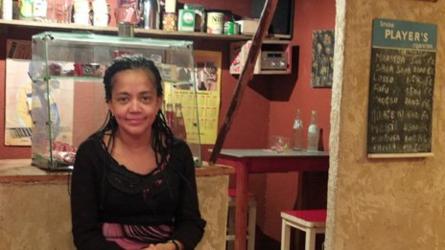
The brutality of Belgian King Leopold II, who negotiated personal ownership of Congo and began to plunder its vast resources in the 19th Century, is well documented.
A campaign by journalists and early human rights activists led to the creation of Belgian Congo in the 20th Century. Maybe the brutality and forced labour was reduced, but the plundering and patronising attitude to Africans continued until Patrice Lumumba's National Congolese Movement brought independence in 1960.
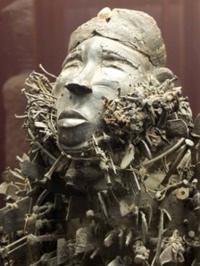
Even then, Belgium couldn't leave Congo alone - there is evidence of Belgian involvement in Lumumba's assassination when he became the first independent prime minister.
The Royal Museum of Central Africa just outside Brussels symbolises many of the, now unacceptable, attitudes to Belgian colonialism.
In the museum's marbled portico, golden statues celebrate the "civilising mission" - childlike Africans clutching imploringly and gratefully to the legs of a heroic Belgian nurse, or soldier, or statesman.
Anthropologist and curator Bambi Ceuppens, herself half-Congolese and half-Flemish, says the way the museum ignored the history of Congolese people - merely treating them like the animals and plants as exhibits to be stared at - led to the plundering of culture too.
She says there are many masks and idols that have obvious spiritual and ritual significance. "But we have lost their stories," she says. "They were brought here just because they looked nice."
Living together
But some Belgians, mostly from the younger generation, believe their nation has unbreakable links to Africa and a responsibility to help mediate the bloody legacy that still grips DR Congo.
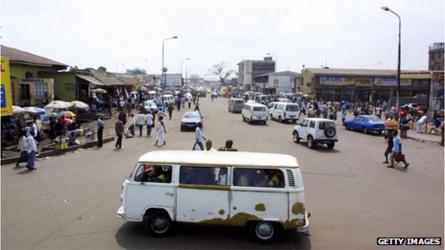
At a quaint, velvet-draped and packed theatre in the Matonge district of Brussels, Belgian producer Raffi Aghekian is introducing his new movie, Kinshasa Mboka Te - Kinshasa Wicked Land - to a mostly white crowd.
It is an offbeat profile of the DR Congo capital, through the lives and sometimes excesses of Kinshasa's people.
"There's a Matonge in Brussels and some of the movie was filmed in Matonge, Kinshasa," Mr Aghekian says. He's concerned that a part of Brussels that should be celebrating Belgium's diversity and history is becoming a place of division and fear.
"I want to bring the two Matonges together," he says.
Another big anti-Rwandan demonstration is planned for 16 February. The news from DR Congo is still bad, with rebel groups, including M23, still in control of many mining areas and tens of thousands still displaced from their homes. Tension in the Brussels Matonge is rising again.
Dan Damon presents World Update on the BBC World Service. Listen back to the programme from Brussels via iPlayer. Additional reporting by Megha Mohan.
-“The root cause of the Rwandan tragedy of 1994 is the long and past historical ethnic dominance of one minority ethnic group to the other majority ethnic group. Ignoring this reality is giving a black cheque for the Rwandan people’s future and deepening resentment, hostility and hatred between the two groups.”
-« Ce dont j’ai le plus peur, c’est des gens qui croient que, du jour au lendemain, on peut prendre une société, lui tordre le cou et en faire une autre ».
-“The hate of men will pass, and dictators die, and the power they took from the people will return to the people. And so long as men die, liberty will never perish.”
-“I have loved justice and hated iniquity: therefore I die in exile.”
-“The price good men pay for indifference to public affairs is to be ruled by evil men.”
READ MORE RECENT NEWS AND OPINIONS
-
▼
2013
(2333)
-
▼
January
(232)
- « Apatrides » : « Les Rwandais ont encore des rais...
- Impamvu zatumye Kagame yirukana umukozi mukuru wa ...
- HRW World Report 2013 Rwanda chapter / Rapport mon...
- HRW World Report 2013 Rwanda chapter / Rapport mon...
- SYFIA GRANDS LACS : Rwanda : Faible et divisée, la...
- 2013 World Press Freedom Index: Rwanda falls 5 places
- 2013 World Press Freedom Index: Rwanda falls 5 places
- Why Kagame will not discuss third term, at least n...
- Why Kagame will not discuss third term, at least n...
- BBC News - Matonge: Congo-Rwanda dispute hits hear...
- BBC News - Matonge: Congo-Rwanda dispute hits hear...
- Rwanda: urugendo rw'umunyamabanga mukuru ruteye ub...
- Leaders postpone signing of DR Congo peace roadmap
- Leaders postpone signing of DR Congo peace roadmap
- Rwanda: Urujijo ku ibura ry’umunyamabanga ushinzwe...
- Ifuni iravuza ubuhuha mu basirikare b’u Rwanda
- Troubling developments in the African Great Lakes ...
- Troubling developments in the African Great Lakes ...
- Fwd: Leta y'agatsiko irashaka kumara abatavuga rum...
- RDC: comment la France a mis la main sur l'uranium...
- Kuwait Compensated $50 Billion For Iraq Crimes: Wh...
- Kuwait Compensated $50 Billion For Iraq Crimes: Wh...
- FDU-INKINGI AND RNC-IHURIRO CONGRATULATE THE NEW U...
- FDU-INKINGI AND RNC-IHURIRO CONGRATULATE THE NEW U...
- Re: La bactérie de la lèpre au secours de l’humani...
- A propos du site leprophete.fr: Fortunatus demissi...
- Rwanda: expulsion d'un militaire belge, un geste "...
- Corruption en Ouganda: remboursez l’aide !
- Rwanda: Paul Kagame says NO to leaving power in 2017
- Rwanda: Paul Kagame says NO to leaving power in 2017
- FDU-Inkingi: Ijambo Bwana Nkiko Nsegimana yavugiwe...
- Victoire Ingabire reste une icône rassembleur de l...
- Ababyeyi bakomeje kugwa ku iseta kubera ubumenyi b...
- Rwanda’s President Kagame: ‘We have a problem’
- Lettre ouverte d’Honoré NGBANDA NZAMBO au Présiden...
- Rwanda’s President Kagame: ‘We have a problem’
- PS-Imberakuri-Madame Uwizeye Kansiime: “Badukubita...
- Kigali: le Rwanda expulse un attaché belge
- VIDEO: HASHIZE IMYAKA 52 U RWANDA RUBAYE REPUBLIKA.
- FDU-Inkingi: Imyaka itatu i Rwanda duharanira Demo...
- VIDEO; IMYIGARAGAMBYO YO GUSHYIGIKIRA INGABIRE VIC...
- Kigali : Abubatse banyuranyije n’amategeko bahawe ...
- Dessin: corrompu, mon douanier?
- Rwanda: Nyuma ya Adré Kagwa Rwisereka muri Green P...
- Kigali ngo ishobora kuba igiye kwibasirwa n’imyiga...
- Bwana Faustin Twagiramungu yaganiriye na Radio Ita...
- Urugendo rwo kwifatanya na Madame Ingabire i Burus...
- Perezida Kagame mu mishyikirano ya rwihishwa na pe...
- Leta y’u Rwanda irimo irakoresha uko ishoboye ngo ...
- Free Victoire Ingabire demonstration in a freezing...
- Free Victoire Ingabire demonstration in a freezing...
- Manifestaion à Bruxelles pour la libération de V. ...
- L’Oklahoma Christian University s’installe au Rwanda
- Boniface Twagirimana : "Tout a été fait pour éloig...
- Olivier Nduhungirehe na we arivuguruje...
- Rwanda: Revealing letter from former RPF member, M...
- Rwanda: Revealing letter from former RPF member, M...
- SOUTH AFRICA: RWANDAN DIPLOMAT INVOLVED IN CRIMINA...
- SOUTH AFRICA: RWANDAN DIPLOMAT INVOLVED IN CRIMINA...
- Victoire Ingabire: A THANK YOU NOTE FROM MY CAPTIVITY
- Victoire Ingabire: A THANK YOU NOTE FROM MY CAPTIVITY
- Victoire Ingabire : DE MA CAPTIVITÉ, JE VOUS ADRES...
- Bruxelles 26 Janvier 2013: Marche de soutien à Mme...
- Hagati y’u Rwanda n’Ubufaransa haranuka urunturuntu
- U.N. Security Council allows drones for eastern Congo
- U.N. Security Council allows drones for eastern Congo
- President Kagame told citizens of Rwanda to tolera...
- President Kagame told citizens of Rwanda to tolera...
- Howard French Is Right On Rwanda's Paul Kagame.
- Howard French Is Right On Rwanda's Paul Kagame.
- [Audio] UBUKUNGU MU RWANDA BWABA BWIFASHE GUTE NYU...
- IKINYOMA CYA LETA Y’I KIGALI N’INTORE ZAYO CYABA K...
- RDC: Igihugu cya Tanzaniya kiyemeje gutabara muri ...
- RDC: Igihugu cya Tanzaniya kiyemeje gutabara muri ...
- RDC : Memo to President Obama on the Democratic Re...
- RDC : Memo to President Obama on the Democratic Re...
- Kongo: Amashirahamwe ategamiye leta atunga urutoke...
- Drones: What are they and how do they work?
- Drones: What are they and how do they work?
- Jeannette Kagame mu bujura akoresheje restaurant y...
- Mu Rwanda guhiga ibyitso birakomeje
- US Senate panel sets Clinton's Benghazi, Kerry's c...
- US Senate panel sets Clinton's Benghazi, Kerry's c...
- Stress testing Rwanda
- Stress testing Rwanda
- Drôles de drones et dissonance en Afandie
- RWANDA: MANEKO ZA KAGAME MURI “NKEZUWIMYE”
- RDC/Rwanda:«Kagame accepte enfin l’envoi des drones»
- RDC: Six cents militaires tanzaniens en route pour...
- Dakar dans la hantise d’un péril islamiste | Slate...
- Obama’s Second Inaugural Speech
- Obama’s Second Inaugural Speech
- Muri Eritrea abasirikari bigometse ku butegetsi bw...
- Ku bw’amaco y’inda abase ba Kagame bamuhanuriye ko...
- Rwanda: Procès de Victoire Ingabire
- BRUXELLES LE 26 JANVIER 2013:Marche de soutien à M...
- Rwanda: Indirimbo za Victoire Ingabire
- Can diplomacy Change the Dictatorial Attitude of K...
- Can diplomacy Change the Dictatorial Attitude of K...
- Fw: Video: Scientologie ; M'POYO KASA-VUBU et Gisè...
-
▼
January
(232)
Popular Posts
-
http://www.jeuneafrique.com/Article/ARTJAWEB20140530163614/fdlr-fardc-kivu-monusco-crise-dans-...
-
Condemned Sudan woman gives birth May 28, 2014 — A 27 year-old S...
-
http://reliefweb.int/report/democratic-republic-congo/rdc-reddition-dune-centaine-de-rebelles-...
-
http://radiookapi.net/actualite/2014/05/30/nord-kivu-reddition-de-100-rebelles-des-fdlr-foka-k...
-
"In the particular circumstances of this outbreak, and provided certain conditions are met, the WHO experts panel reached consensus tha...
-
Tuvugshukuri , ntabwo nabonye message ya Agnes urimo gusubiza kuko itari kuri message yawe, ar...
-
http://ikazeiwacu.fr/2014/12/16/apart...
-
Aliko se uwarebera mu zindi ndorerwamo, aho ntiyabona ko il iya Brexit ishobora kugira...
-
Comment les erreurs politiques des Burundais les trahissent ( en quatre points) ? 1. Les Burundais ne comprennent rien de la just...
WebMD Health Channel - Sex & Relationships
Love Lectures
How We Made It In Africa – Insight into business in Africa
David DeAngelo - Dating Questions For Men
Christian Carter - Dating Questions For Women
Women - The Huffington Post
Recent Articles About Effective Communication Skills and Self Development
Useful Links
- Africa Works
- Africa Development / Afrique et Developpement
- Africa Desk
- Africa Portal
- International Politics From the Margins
- Democracy in Africa
- Africa in Transition
- African Arguments
- Observatoire de l’Afrique
- International African Institute
- African Studies on H-net
- Royal African Society
- African Studies Association UK (ASAUK)
- African Studies Association (ASA)
- How we made it in Africa
- All Africa
- The Africa Report
- Think Africa Press
- Africa Desk
- African Studies Internet Resource at Columbia University
- African Studies Resource at Columbia University Libraries
- The Nordic Africa Institute
- The African Studies Centre at Leiden University
- African Studies Center at University of Pennsylvania
- Institute of African Studies at Carleton University
- Yale Council on African Studies
- Institute of African Studies at Emory University
- African Studies Program at University of Wisconsin
- Center for African Studies at the University of Florida
- African Studies at Johns Hopkins University
- African and African Diaspora Studies at Boston College
- African Studies Center at Boston University
- African Studies Program at Ohio University
- African Studies Centre at Michigan State University
- Harvard’s Committee on African Studies
- Institute for African Studies at Columbia University
- African Studies Centre at University of Bradford
- Africa Regional Interest Group at Durham University
- Centre of African Studies at SOAS
- Centre of African Studies at University of Edinburgh (UK) :
- Centre for the Study of African Economics at University of Oxford
- United Nations. ReliefWeb
- Institut de recherche pour le developpement
- Global Issues That Affect Everyone
- Africa Files
- Centre for the Study of Human Rights
- Institute for Holocaust and Genocide Studies
- Harvard University Committee on Human Rights Studies
- Institute for the Study of Human Rights
- Montreal Institute For Genocide and Human Rights Studies
- Cohen Center for Holocaust & Genocide Studies
- Center for Holocaust and Genocide Studies
- The Center for Human Rights and Genocide Studies
- Strassler Center for Holocaust and Genocide Studies
- International Institute for Genocide and Human Rights Studies
- The Stanley Burton Centre for Holocaust and Genocide Studies
- The Genocide Studies Program
- Institute for Anthropological Research in Africa
- The Association of African Universities (AAU)
- The British Institute in Eastern Africa
- The Africa Research in Sustainable Intensification for the Next Generation (Africa RISING)
- Forum for Agricultural Research in Africa
- About Africa Research Online
- Africa Research Institute


